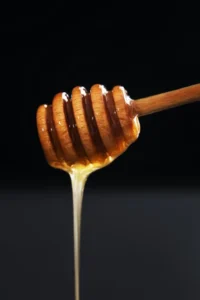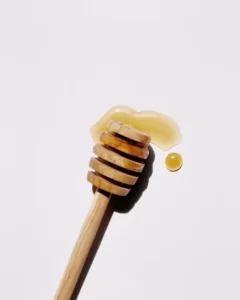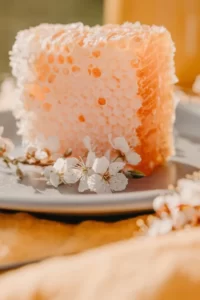Table of Contents
Honey has become a trendy ingredient in the world of skincare, with its use dating back to ancient times. However, the type of honey that has gained popularity among skin professionals and celebrities is not the same honey found in your pantry. Enter manuka honey, produced by bees that feed on New Zealand’s manuka bush. The Kardashian family, known for their influence on beauty trends, have played a significant role in promoting the benefits of manuka honey for skincare. Kourtney Kardashian, in particular, partnered with the brand Manuka Doctor and became a global ambassador for their manuka honey-based products.
The Rise of Manuka Honey in Skincare
Manuka honey has become a key ingredient in various skincare products offered by brands such as OY-L, Naturopathica, Kiehl’s, and Eczema Honey. These products are designed to improve the overall health and appearance of the skin. However, it is also possible to harness the benefits of manuka honey by applying it directly to the skin as a DIY treatment. Mixing manuka honey with warm water or oatmeal can create a nourishing mask for the skin.
Research Suggests Manuka Honey May Help Treat Eczema
One of the reasons manuka honey has gained attention in the skincare community is its potential to treat eczema. Honey, in general, possesses antibacterial and anti-inflammatory properties, making it beneficial for managing skin conditions. However, manuka honey takes the lead in terms of non-peroxide antimicrobial activity, as highlighted in a study published in the journal AIMS Microbiology. The unique antibacterial properties of manuka honey are attributed to its active ingredient, methylglyoxal, which releases hydrogen peroxide. Additionally, manuka honey has been associated with wound repair, which can aid in the healing of eczema patches.
Hydration Benefits for Eczema-Prone Skin
One of the challenges faced by individuals with eczema is maintaining skin hydration. Honey, including manuka honey, can help address this issue. Daniel P. Friedmann, a board-certified dermatologist, explains that honey acts as a thick emollient, effectively trapping moisture in the skin. This is crucial for eczema-prone skin, as it helps protect against bacteria, allergens, and other irritants. The Mayo Clinic also emphasizes the importance of retaining skin moisture in managing eczema.
While there is limited scientific research specifically focused on manuka honey’s effect on eczema, a small study published in the journal Immunity, Inflammation, and Disease showed promising results. Participants with eczema applied manuka honey to one affected area of the skin for a week, while leaving another area untreated as a control. The area treated with manuka honey demonstrated significant improvement compared to the control. However, larger studies are needed to draw definitive conclusions. A study published in the American Journal of Clinical Dermatology suggested that while manuka honey has shown some positive effects, more research is required to recommend it as a standard treatment for eczema.
Risks to Consider When Using Honey for Eczema
Although honey is generally safe to use, it is possible to have an allergic reaction, especially for individuals allergic to bees or pollen. It is advisable to conduct a patch test before fully using a honey-based product. Apply a small amount to an unaffected area of the skin, such as the inner forearm, and wait for any signs of redness or irritation. Individuals with a history of allergic reactions should exercise caution and wait one to two days before using honey-based products.
It is important to note that honey is not recommended for babies under one year old due to the risk of botulism, a serious disease, as stated by the American Academy of Pediatrics.
When purchasing manuka honey products, it is crucial to ensure their quality. Look for the Unique Manuka Factor quality trademark, which verifies that the product has been endorsed by New Zealand’s Unique Manuka Factor Honey Association.
Dermatologists’ Views on Honey as an Eczema Treatment
While some individuals swear by the benefits of honey for eczema, dermatologists have varying opinions on its effectiveness. Nazanin Saedi, a board-certified dermatologist, does not personally recommend honey as a skincare product. Natalie Yin, another board-certified dermatologist, suggests that while honey has positive attributes, it should not be the sole treatment for eczema. She emphasizes the need for more rigorous scientific studies to confirm its benefits in managing eczema flares. Daniel P. Friedmann echoes these sentiments, stating that there are numerous products available at drugstores that can effectively address eczema without the mess associated with using honey.
In conclusion, manuka honey has gained popularity in the skincare world, with claims of its benefits for eczema treatment. While scientific research is limited, manuka honey’s antibacterial and moisturizing properties make it a potential option for managing eczema. However, individuals should be aware of potential allergic reactions and the need for more extensive research to establish its effectiveness.



